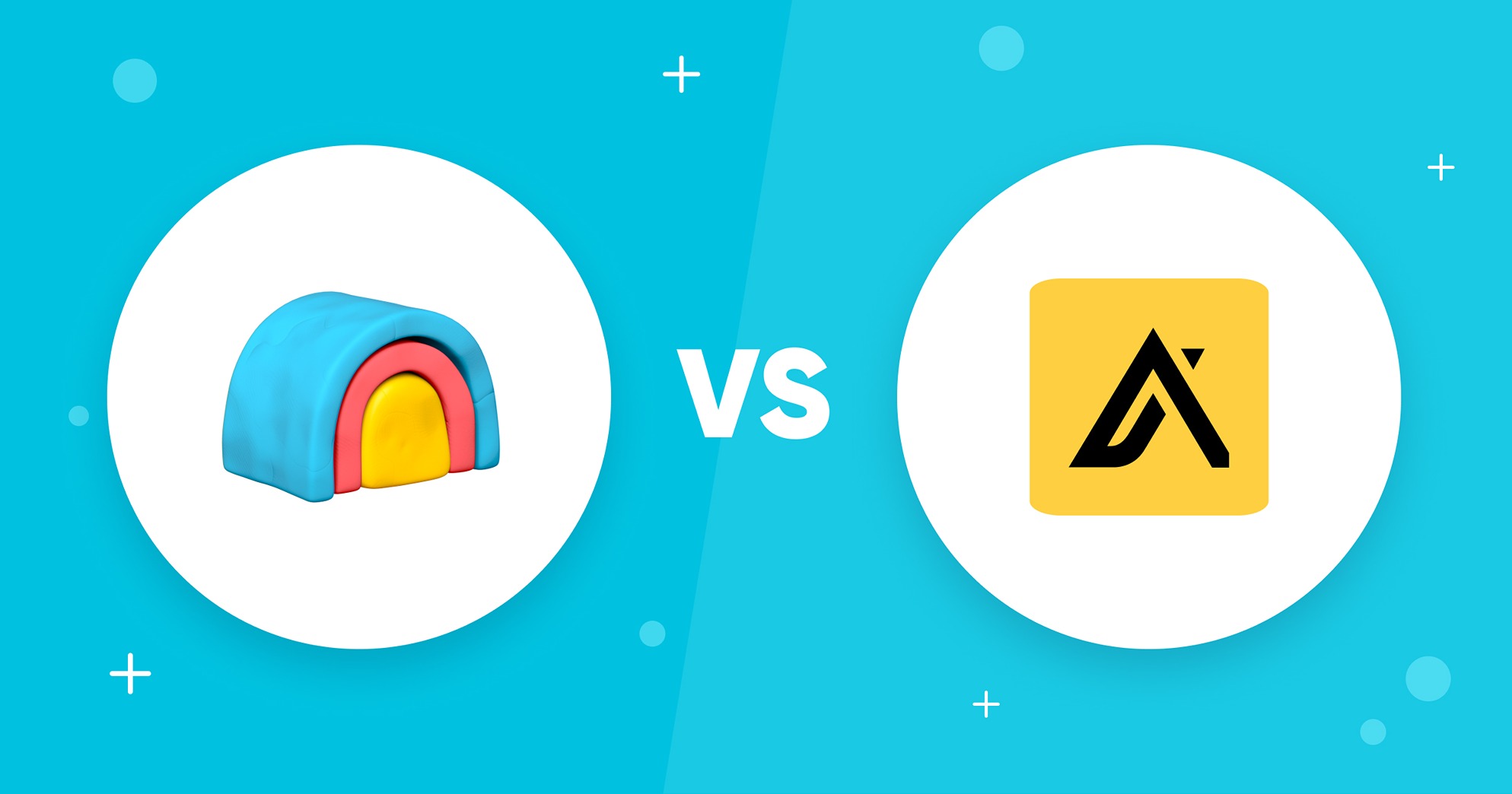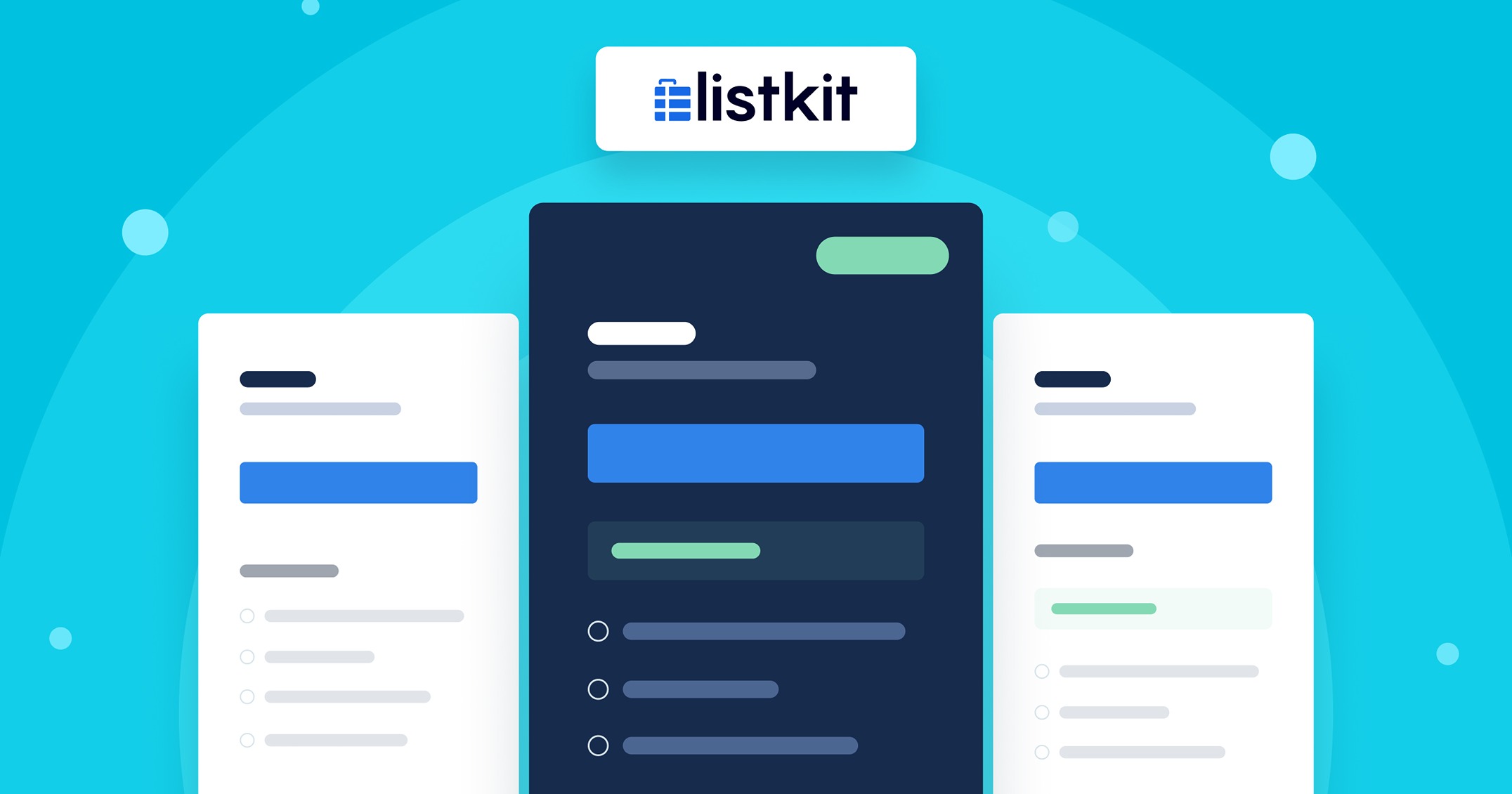Every business owner knows that one of the main success factors is having the right connections. The more people you can reach with your products or services, the better your chances of success. This is why platforms like Lusha and RocketReach are important. They are B2B sales intelligence tools that make lead generation hassle-free. This article will examine each of them in detail, highlighting their strengths, weaknesses, similarities, and differences.
What is Lusha?

Since its launch in 2016, Lusha has become one of professionals’ most popular lead-generation tools. Its main function is to help businesses find and connect with potential customers, partners, or candidates by providing accurate and up-to-date contact details. It combines crowdsourcing with artificial intelligence and data validation to ensure that its contact database is accurate.
Lusha has several tools that users can use to find relevant contacts based on specific criteria, such as job titles, industries, company size, and location. Over 100 million business profiles and 15 million company profiles are on the platform, making up a vast database of contact info.
Lusha Pros & Cons
Pros
- Lusha’s user-friendly design makes it easy to navigate the platform.
- Its database of leads and connections is diverse and extensive.
- It comes with a browser extension that helps you access contacts quickly.
- The contact information on Lusha is highly accurate, featuring decision-makers’ names, job titles, email addresses, and phone numbers.
Cons
- You must have a running subscription to use Lusha to its full extent, as the free version limits your searches and restricts some features.
- The subscription plans are relatively expensive.
What is RocketReach?
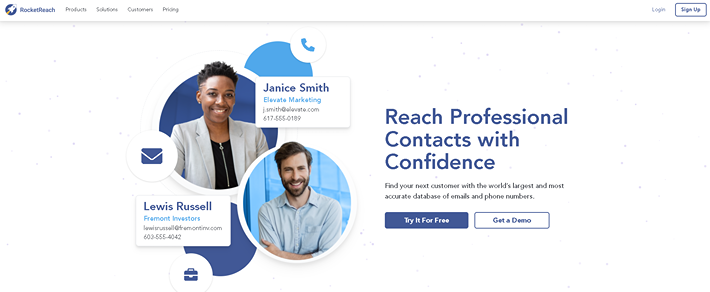
RocketReach stands out among most B2B data providers, with over 700 million individual and 60 million company profiles. This massive database of contact information makes it an incredibly powerful tool for finding contact information for almost any business or professional worldwide.
RocketReach boasts an 85% data accuracy rate, making it one of the most accurate and extensive contact databases on the Internet. It has advanced search capabilities and over 100 search filters to allow users to pinpoint specific profiles based on criteria such as job titles, industries, company sizes, locations, and technologies used.
RocketReach Pros & Cons
Pros
- RocketReach’s massive database and effective search filter make it easy to find almost any professional profile online.
- The contact information it offers is highly accurate and reliable.
- The user-friendly platform allows you to find what you need quickly and easily.
- It uses AI algorithms to improve search accuracy and provides users with hints about potential customers’ interests and needs.
Cons
- Though you get a free trial, RocketReach is designed primarily for paid subscribers, as its free version limits access for users without an active subscription.
- The expensive subscription plans make using the platform difficult for small businesses and individual professionals.
Lusha vs. RocketReach Comparison Guide
Having briefly examined these platforms and highlighted their pros and cons, let’s compare them based on certain criteria, such as key features, database reliability, and usability.
Key Features
Both Lusha and RocketReach offer exciting features that take lead generation to the next level. We’ll examine the key features of each platform individually, beginning with Lusha.
Lusha
Lusha’s goal is to improve B2B contact data finding and management; to this end, it offers a range of features. Some of its key features are highlighted below.
- Prospecting Tools: Lusha has a great prospecting tool that makes identifying and targeting prospective leads easy. This tool is useful for a sales analyst or team, as it simplifies lead generation and saves time that would otherwise be spent prospecting manually.
- Buyer Intelligence: This feature helps guide lead generation by giving users insights into the interests of potential customers.
- Data Enrichment: Lusha’s data enrichment feature ensures that all contact information is accurate and up to date by constantly updating and filling information gaps.
- Lusha API: The Lusha API feature also allows for seamless integration of Lusha’s contact data into different applications.
- Dashboard Analytics: Lusha users can use dashboard analytics to track and analyze key performance indicators and metrics.
RocketReach
Though RocketReach has its own set of unique features, it also shares many similarities with Lusha. Some of the key features are below.
- Intent Data: Similar to Lusha’s Buyer Intelligence, RocketReach’s Intent Data feature increases your chances of finding buyers by providing enough data to understand potential customers’ purchase intent.
- AI-Enhanced Search: Unlike Lusha, RocketReach has an advanced search feature that uses AI to help you find specific profiles. It also provides effective AI-powered recommendations, using AI algorithms to find profiles similar to your searches, increasing your chances of finding more new contacts.
- Lists: RocketReach allows you to create detailed contact lists. If you’re running a campaign and need to make a list of contacts of potential customers, you can do this quickly and easily.
- Data Quality: Like Lusha, RocketReach constantly updates its data quality, ensuring that users always have the correct and up-to-date contact information.
- Integration: RocketReach users have the opportunity to use the platform’s contact data seamlessly on other applications. This is similar to the Lusha API tool.
Database & Contact Reliability
Another way to compare Lusha and RocketReach is based on their databases and contact reliability. Let’s examine the key points for each tool below.
Lusha
Lusha has over 100 million business profiles and 15 million full company profiles. This data is sourced from various public sources, such as social media feeds, online databases, and government sources. Crowdsourcing and a proprietary algorithm also help Lusha continuously enrich its database.
Lusha boasts an 81% data accuracy rate above the industry average of 60-70%. The data includes critical attributes such as full names, email addresses, phone numbers, job titles, seniority levels, roles, and company information, providing users with comprehensive insights into potential leads and their organizations. The database covers various industries, making it a valuable resource for B2B sales and marketing efforts.
RocketReach
RocketReach boasts a larger database than Lusha, with over 700 million individual contacts and 35 million company contacts worldwide. It gathers data from various sources, such as web pages, APIs, online profiles, and social media platforms.
RocketReach also beats Lusha in data accuracy, with an accuracy rate of 85%. The data includes email addresses (both professional and personal), phone numbers (direct dials and mobile), and a wide range of firmographic data points such as annual revenue, number of employees, industry, and location. This comprehensive information allows users to create highly targeted prospect lists and conduct precise searches.
Integrations & API
You can judge a lead generation tool by how well it integrates. That makes integration and API an important basis for comparing Lusha and Rocket Reach.
Lusha
- CRM Integration: Lusha integrates with popular CRM platforms like HubSpot, Salesforce, Zoho, Pipedrive, and more. As a result, leads from the Lusha database can be imported directly into users’ companies’ CRMs, streamlining the sales process and ensuring accurate data.
- Email Marketing Integration: Lusha also integrates with email marketing platforms such as Outlook, Gmail, Mailchimp, and Aweber. This integration lets you send leads directly from Lusha’s contact database to these platforms.
- API Integration: Lusha users use its API integration feature to incorporate their functionalities directly into their company’s applications. This enables lead generation, profile enrichment, contact discovery, and company search automation in real time.
RocketReach
- CRM Integration: Like Lusha, RocketReach offers CRM integrations, including HubSpot, Salesforce, and Pipedrive. This seamless integration ensures that verified contact information is sent to your CRM database in real-time, enhancing data accuracy and improving sales performance.
- Email Marketing Integration: RocketReach can be integrated with email platforms like Gmail and Outlook.
- Applicant Tracking System: While both Lusha and RocketReach offer integration capabilities, RocketReach has a more extensive integration ecosystem, including instant messaging platforms like Slack. The integration with applicant tracking systems is one example. This expands the tool’s utility beyond sales and marketing.
Usability
Both Lusha and RocketReach offer relatively user-friendly experiences, but there are some differences in their usability and ease of implementation.
Lusha
Lusha’s interface is simple and easy to navigate, allowing users to quickly search for contacts, view details, verify emails, and export lists. Deploying Lusha is also straightforward, as the browser extensions and CRM/email add-ins can typically be installed and set up within minutes, even by non-technical users.
RocketReach
RocketReach has more customization options and advanced features, which makes it a little more complex than Lusha. But this doesn’t mean RocketReach is not easy to navigate once you get the hang of it. Implementation may require more planning depending on your uses, like mapping data fields to your CRM or designing custom campaigns to leverage RocketReach’s full capabilities.
Chrome Extension
Lusha and RocketReach offer Chrome extensions that allow you to find contact information from LinkedIn profiles and company websites quickly and while browsing the web.
Lusha
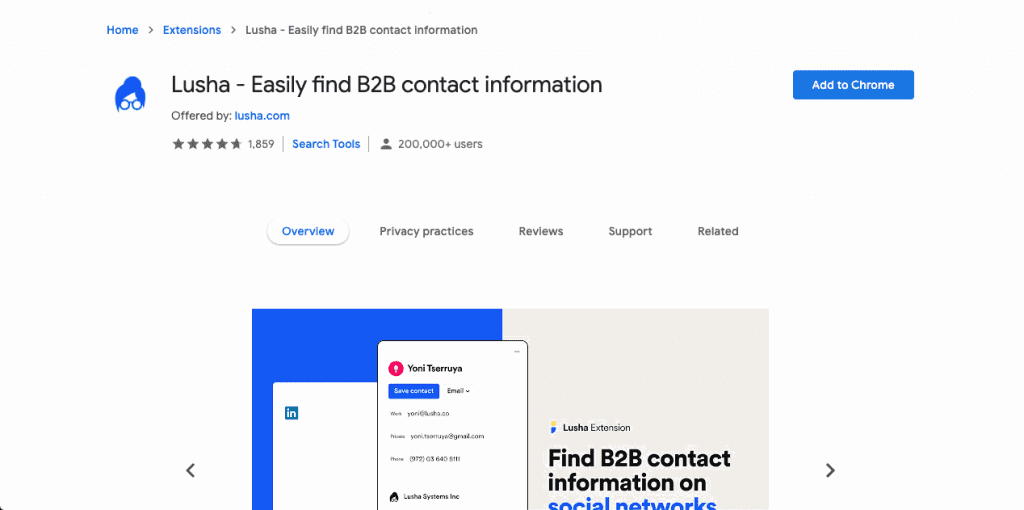
Lusha’s free Chrome extension is one of the platform’s top features, as it integrates seamlessly with existing workflows. You can instantly see verified emails, phone numbers, and other professional data on any LinkedIn profile, Gmail, or web page with just one click. You can also export and update contact details straight into your CRM, and track email opens/clicks, and more within your browser.
RocketReach
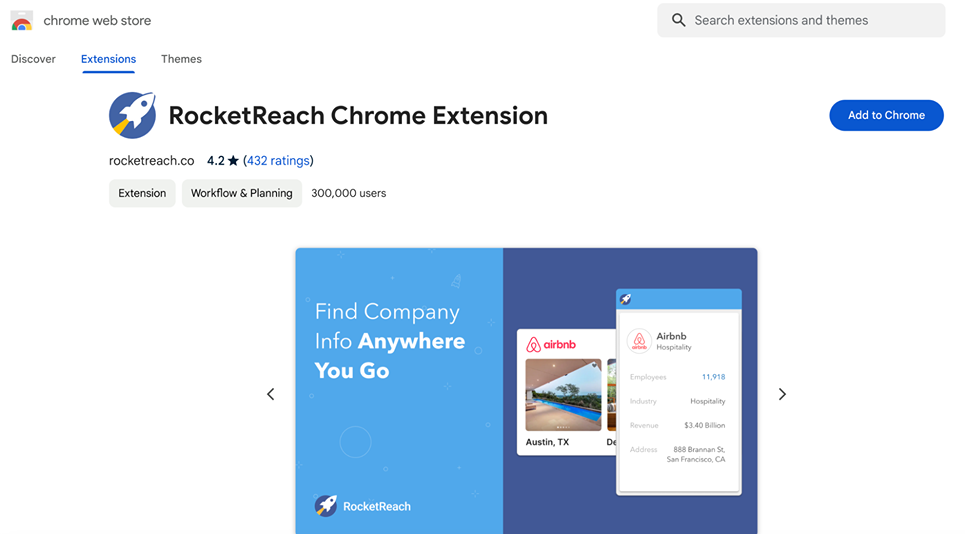
RocketReach’s free Chrome plugin surfaces contact info across websites, LinkedIn, and more with a single click. You’ll see full names, emails, phone numbers, employment history, and any other available details RocketReach has on an individual. You can instantly export data, start outreach campaigns, and update your CRM records from the web.
Plans & Pricing
Understanding the pricing options and what’s included at each tier is crucial when budgeting for and selecting between Lusha and RocketReach. Here’s a breakdown of Lusha and RocketReach’s pricing.
Lusha
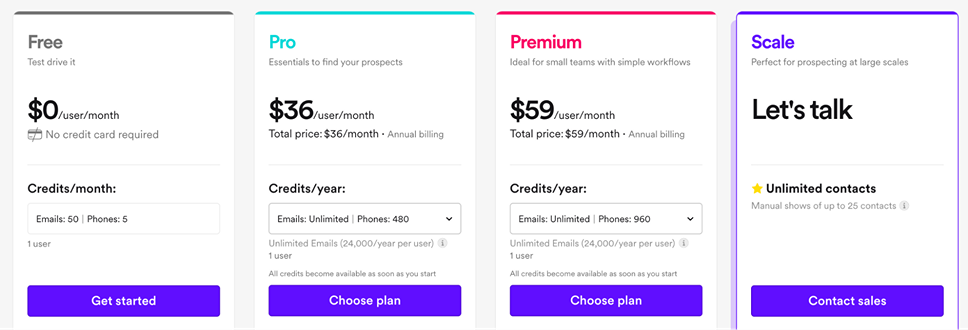
Lusha offers a credit-based pricing model. You pre-purchase packs of “credits” to access the platform’s services. Credits are deducted at different rates for actions like email lookups, exports, enrichment, and more.
- Free Plan: 5 free credits, no credit card required
- Pro Plan: 480 credits for $36/month/user
- Premium Plan: 960 credits for $59/month/user
- Scale Plan: Custom pricing for enterprise teams
RocketReach
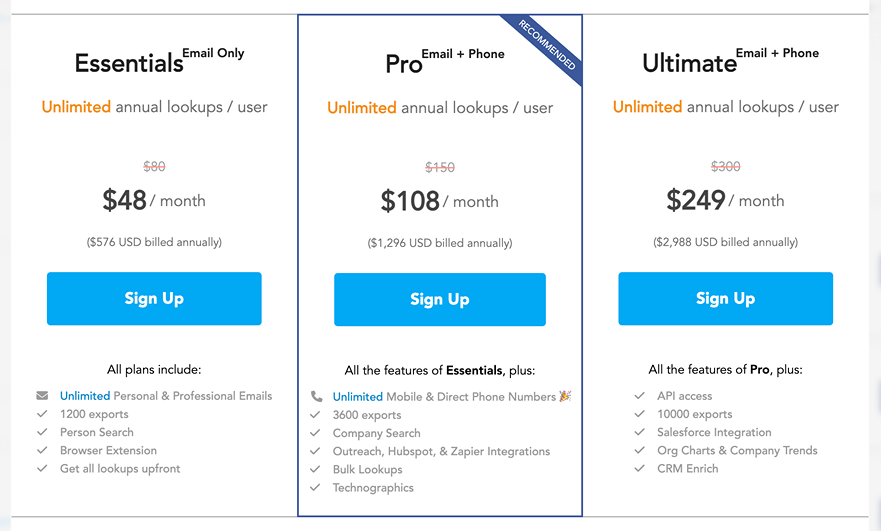
RocketReach offers free and three main pricing plans: Essentials, Pro, and Ultimate.
- Free Plan: Five free lookups per month, no credit card required
- Essentials Plan: 80 lookups monthly for $39/month or 1200 lookups annually for $468/year (This plan provides access to email addresses only.)
- Pro Plan: 200 lookups monthly for $99/month or 36000 lookups annually for $1,188/year (This plan covers email and phone)
- Ultimate Plan: 500 lookups monthly for $249/month or 10,000 lookups annually for $2,988/year (This plan covers email and phone)
Main Differences Between Lusha vs. RocketReach
Lusha and RocketReach aim to help established companies and small businesses generate leads. However, there are some key differences between the two tools.
Data Reliability
While both platforms aim to provide accurate contact info, there are differences in how reliable and up-to-date the data is. RocketReach data has an 85% accuracy, higher than the 81% of Lusha. Lusha only crawls publicly available web sources to gather its data, while RocketReach combines crawling with public records, subscriptions, and other sources, giving it more comprehensive data.
Contact Filtering & List Building
Both tools let you search for and build lists of contacts. Lusha has basic filtering options, such as company revenue and headcount, that let you search for contact info and build prospect lists. RocketReach offers deeper search filters with the help of AI, including job titles and company locations. Therefore, RocketReach is a better option for discovering new contacts and building effective lists.
Intent Data
RocketReach provides intent data that helps identify potential buyers who are actively seeking solutions. This allows businesses to engage with interested prospects, potentially shortening the sales cycle. Lusha does not explicitly offer this type of intent data.
AI & Sales Intelligence
Both tools leverage AI but in different ways. Lusha uses AI combined with crowdsourcing to verify and maintain accurate and up-to-date contact data. RocketReach uses AI to provide intelligent recommendations for building highly customized prospect lists based on filters like location, job title, and industry. This AI-driven approach can save significant time in efficiently discovering new contacts.
Analytics
Lusha offers deep dashboard analytics and options for tracking key metrics related to your prospecting efforts. However, compared to Lusha, RocketReach gives more robust campaign tracking, engagement metrics, and ROI reporting.
Compliance
Lusha takes compliance seriously. It adheres to major data protection regulations like GDPR and CCPA and is SOC 2 Type II certified, ensuring data security and user privacy. RocketReach also offers advanced compliance tools to align with data regulations like GDPR, CCPA, and more, but Lusha has stronger compliance measures.
Lusha vs. RocketReach Comparison Table – 100 Words
Here’s a quick side-by-side comparison of Lusha and RocketReach:
| Lusha | RocketReach | |
| Database Size | 100+ million business profiles and 15+ million full company profiles. | Over 700 million professionals and 35+ million companies. |
| Data Types | Lusha provides businesses’ contact information, such as full names, email addresses and phone numbers, and company information, such as company details, industry, revenue, etc. | RocketReach provides data types like companies’ contact info (names, emails, phone numbers) and firmographic data points (revenue, employee count, location etc.). |
| Unique Features | Buyer intelligence, data enrichment, Lusha API, dashboard analytics | Intent data, campaign analytics, AI-enhanced search, detailed contact lists, quality data |
| Free Trial | 5 free credits, no credit card required | 5 contact lookups, no credit card required |
| Pricing | Lusha has three paid plans: Pro ($36/month), Premium ($59/year), and a customizable Scale plan. Pricing is credit-based. | RocketReach has 3 plans – Essentials ($468/year), Pro ($1,188/year), and Ultimate ($2,988/year) based on the number of lookups. |
| Chrome Extension | Available. A basic Chrome extension in the free plan and advanced extensions in the paid plans. | Available in both free and paid plans to enable quick access to contacts. |
| Integrations | Lusha integrates with CRMs like HubSpot, Salesforce, and Zoho, as well as marketing tools. | RocketReach integrates with CRMs like Salesforce and HubSpot as well as email clients like Gmail and Outlook. |
| Compliance | Lusha complies with standards like GDPR and CCPA and uses third-party data verification. | Basic data privacy |
| Target User | Individual sales reps and marketers | Businesses of all sizes across industries. |
| Best For | Contact finding, B2B leads | Contact management, sales intelligence, lead gen, building efficient prospect lists |
Which is Better, Lusha or RocketReach?
In summary, both Lusha and RocketReach offer valuable sales intelligence and contact data services – but they excel in slightly different areas based on your specific goals and business needs.
Choose Lusha If You Need an Easy-to-Use Contact Finding Tool
For sales reps, marketers, or small teams looking for an intuitive, affordable way to quickly find and verify direct dials, emails, and basic professional details, Lusha is a great choice.
Its features, such as browser extensions, fast search capabilities, and straightforward pricing, make it easy to get up and running quickly for tasks like email list building. However, it doesn’t offer more robust company insights like RocketReach.
Choose RocketReach If You Need Enterprise-Grade Sales Intelligence
RocketReach is a more comprehensive platform for larger sales organizations with complex data demands.
In addition to deeper contact details, RocketReach provides richer firmographic intelligence, intent data, native CRM integration, and better analytics. It’s a more robust (and more expensive) solution and better suited to those looking for advanced features.
UpLead is the Best Alternative to Both Tools
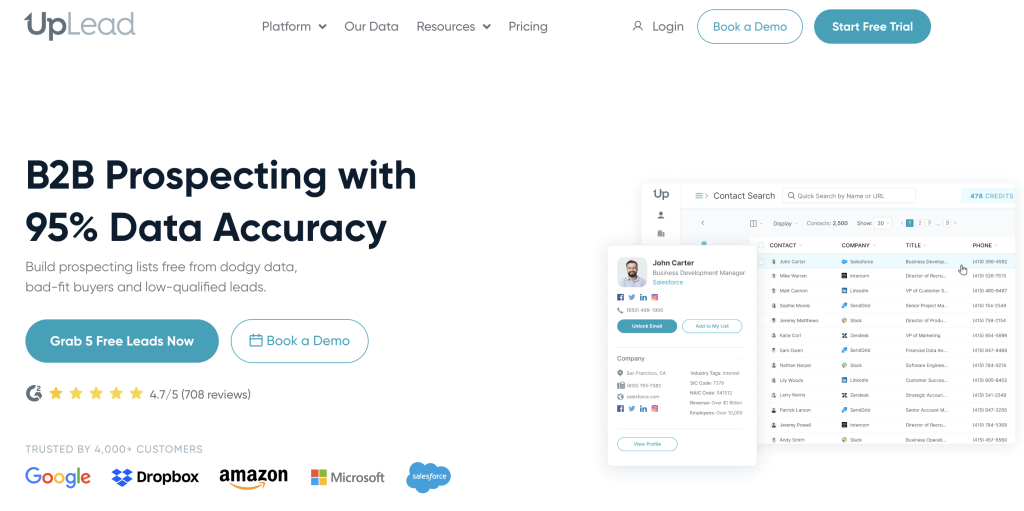
While both Lusha and RocketReach are powerful sales intelligence solutions, UpLead has emerged as arguably the best alternative, improving upon the strengths of both tools.
UpLead boasts an extensive 155+ million B2B contact database and 19+ million global company profiles with a 95% accuracy guarantee, making it more reliable than RocketReach’s 85% and Lusha’s 81% rates. It offers advanced search filtering features like RocketReach, making it easy for users to find prospects that match their ideal profiles.
UpLead’s transparent and affordable pricing makes it a compelling alternative to Lusha and RocketReach. You can start a 7-day free trial with 5 credits and have access to the Chrome extension at any time.
FAQs About Lusha vs. RocketReach
Below are the answers to some frequently asked questions about Lusha and RocketReach.
Some data providers, like UpLead, ZoomInfo, and Apollo, can be considered better alternatives to Lusha because they offer richer datasets and capabilities and are useful for more advanced B2B data needs.
While Lusha has a popular LinkedIn integration, it allows you to search for and find contacts across sources beyond just LinkedIn, like Gmail and web pages.
RocketReach is not the same as LinkedIn, although it does integrate with LinkedIn data. It’s a lead generation and contact-finding solution with broader B2B database coverage.
Most reviewers find RocketReach’s data reasonably accurate and reliable, though some outdated info can slip through given its large database size. Ultimately, it’s a trusted solution for finding B2B data.
Yes, RocketReach is a legitimate data provider many companies use for prospecting, lead generation, and contact management workflows.
What You Need to Remember About Lusha vs. RocketReach
Here are some takeaways to keep in mind while weighing your options between Lusha and RocketReach:
- Lusha and RocketReach are powerful but different tools for sales prospecting and lead generation
- Lusha prioritizes basic data and easy access, while RocketReach leans into AI algorithms and database size
- The ideal choice between Lusha and RockeReach depends on your priorities around data needs, budget, and AI capabilities.
- Thoroughly evaluate your options before selecting a sales intelligence solution. A Lusha and RocketReach alternative, like UpLead, can provide the best combination of features from these two tools


